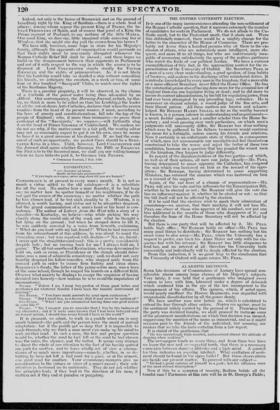THE OXFORD UNIVERSITY ELECTION.
IT is one of the many inconveniences attending the non-settlement of the Roman Catholic question, that it narrows extremely the number of candidates for seats in Parliament. We do not allude to the Ca- tholic merit, but to the Protestant merit, that it shuts out. Were this shibboleth removed, there would be a mighty change for the better in the character of the House of Commons. There ere pro- bably not fewer than a hundred persons who sit there to the ex- clusion of others, who are notoriously more intelligent, more elo- quent, and more fit in all things, but who are unfortunately inca- pable of answering satisfactorily the query of the zealous partisans who watch the fords of our political Jordan. We have a curious exemplification of this fact, in the approaching contest for the re- presentation of the University of Oxford. Mr. Secretary PEEL is a man of a very clear understanding, a good speaker, of long habits of business, and zealous in the discharge of his ministerial duties. It is indeed acknowledged by every man in the kingdom, that a moreable or a more efficient Secretary never filled the Home Office. He has the substantial praise also of having done more for the criminal law of England than any one legislator living or dead; and he did more to insure its correct administration, by his bill for regulating juries, than had ever been attempted by any preceding legal reformer. He is moreover an elegant scholar, a sound judge of the fine arts, and their liberal patron. All these matters are known and acknow- ledged. Sir ROBERT HARRY INGLIS, so far as the worthy baronet is known, is a person inferior in understanding and:acquirements- a much feebler speaker, and a smaller scholar than the Home Se- cretary ; and even passing over such particulars, on which men's judgments will necessarily differ, Sir ROBERT has done nothing which were he gathered to hiS fathers to-morrow would continue his name for a fortnight, unless among his friends and relations. Now it certainly is an unfortunate state of things, in consequence of which, men not unreasonable nor unenlightened feel themselves constrained to take the worse and reject the better of these two candidates, because on a question that has puzzled the wisest men in the kingdom, they happen to judge differently. In respect of the disinterestedness of the two parties—of which, as well as of their actions, all men can judge clearly—Mr. PEEL having determined to cease opposing the Catholics, has resigned the seat which was bestowed on him as the reward of his oppo- sition; Sir ROBERT, having determined to cease supporting Ministers, has retained the sinecure which was bestowed on him as a reward of his support. Again, of the cui Bono of a change of representatives—Mr. PEEL will give his vote and his influence for the EmancipationBill, whether he be elected or 'not ; Sir ROBERT will give his vote (he has no influence) against it, whether he be elected or not : so that the bill itself will not be affected by the election. If it be said that the electors wish to mark their admiration of consistency—we answer, that their marking it will not lose Mr. PEEL one cheer of those who approve of his conduct, nor put one hiss additional in the mouths of those who disapprove of it; and therefore the fame of the Home Secretary will not be affected by the election.
But there is one party that will be affected by it. Mr. PEEL holds high office ; Sir ROBERT holds no office—Mr. PEEL has many good things to distribute ; Sir ROBERT has nothing but his sweet voice to give away—Mr. PEEL, when the University has a request to prefer, can back his Alma Mater not only with his elo- quence but with his interest ; Sir ROBERT has little eloquence to lend her, and no interest at all : therefore the University both corporately and individually will be deeply affected by the election. From this induction, it is no great leap to the conclusion that the University of Oxford will again return Mr. PEEL.


















 Previous page
Previous page